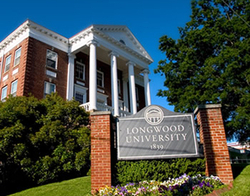
One year ago, Longwood University announced it would increase costs just 2.1 percent in 2014-15 – the smallest increase at any Virginia public university since 2001.
President W. Taylor Reveley IV said Longwood aspired to fundamentally change the economics of college affordability, and the announcement attracted notice across the Commonwealth. The idea was to draw support from philanthropy and invest in retaining students, rather than continuing to ask students and families to fund the seemingly relentless price increases typical across higher education.
This past Saturday, Longwood demonstrated the strength of that commitment. Citing institutional momentum and the highest percentage enrollment growth of any Virginia public university since 2012-13, the University’s Board of Visitors approved a second consecutive increase of less than 3 percent. That’s by far the smallest two-year price increase seen at any Virginia public university since 2001-02.
"Every year, a four-year college degree becomes more essential for the American dream," Reveley said. "There are many reasons why college costs have risen, and not all are in our hands. But we are sending a message: We hear loud and clear that over the years ahead, families won’t be able to sustain current national trends of rising tuition prices and student debt, and we will do our share to ensure college remains within reach."
For 2015-16, Longwood will increase undergraduate tuition and mandatory fees by 2.8 percent. Over the past decade, the average annual increase at Virginia public universities has been nearly 7 percent.
The charge for tuition and mandatory fees for in-state undergraduates carrying a full course load in 2015-16 will be $11,910 per year. Nearly three-quarters of Longwood students receive financial aid to assist with that cost.
The true value of Longwood’s educational program is substantially higher even than the list price. Longwood emphasizes small classes and has the highest proportion of classes taught by full-time faculty of any public institution in the state. Altogether, the resources devoted annually to education at Longwood exceed the costs borne by students and families by almost $30 million, thanks to public funding and to philanthropy.
"The easy path would be to charge students and families as much as we think they can possibly afford," said Rector Colleen McCrink Margiloff ’97. "But Longwood is in the business of transforming lives, and so we would rather focus on supporting and mentoring our students to graduation. That’s better for our students, and it’s also the best way to ensure Longwood continues on strong financial footing."
Out-of-state undergraduates will see the same overall percentage increase in tuition and mandatory fees as in-state students.
Longwood, a comprehensive public liberal arts university, celebrated its 175th anniversary last year. It is among the 100 oldest colleges and universities in the nation, and the third-oldest public university in Virginia, following the College of William & Mary and the University of Virginia. This year, total enrollment surpassed 5,000 for the first time, and Longwood’s 5.4 percent enrollment increase since academic year 2012-13 is first among Virginia public four-year institutions.
Since President Reveley took office two years ago, his top priority has been raising Longwood’s already-strong graduation rates. Longwood aspires to continue gradual enrollment increases, but largely through student retention rather than expanding the size of incoming classes or the overall scale of Longwood’s tight-knight residential community. A new Division of Strategic Operations, working closely with Academic Affairs, Student Affairs, and Finance and Administration, is particularly focused on retention, and has enlisted sophisticated data analysis to support its efforts to improve student outcomes.
"For too long, the focus of higher education has been on simply getting students into college," Reveley said. "In the 21st century, a college degree is fundamental to a strong career and engaged citizenship, so our focus must shift to getting students through. Keeping tuition affordable, while ensuring all our students get the support they need to succeed, is the cornerstone of those efforts."
"Continuing these efforts to keep college affordable will require commitment from all who value the extraordinary contributions Virginia’s public universities make to the Commonwealth, with the support of the General Assembly and the Governor for Virginia’s students essential and deeply appreciated," Reveley continued. "But while higher education generally is in a time of great transition, Longwood is in strong shape, with record applications, and annual giving and alumni participation up more than 10 percent this year."
"In the past year, this enrollment strength and improving the efficiency of our operations have enabled us to move forward with well-deserved merit increases for our dedicated faculty – who are as committed and hard-working as any faculty in Virginia," he said. "We’re investing in new educational opportunities for our students, like undergraduate research and travel abroad. It’s only right and fair that we also do what we can for our students and their families, to ensure they set off on careers as citizen-leaders without being deeply burdened by student debt."

